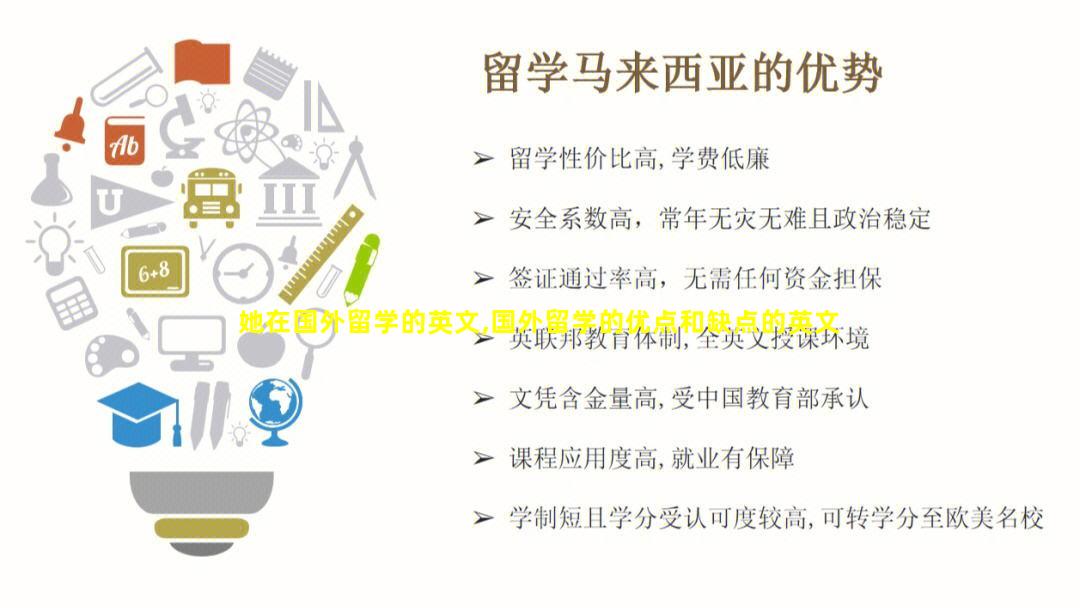 策留网
策留网She is studying abroad
Advantages of Studying Abroad
Gain a global perspective: Immerse yourself in a different culture and gain a broader understanding of the world.
Enhance language skills: Develop fluency in a foreign language by interacting with native speakers and taking language classes.
Increase employability: Expand your career opportunities by acquiring international experience and skills that are highly valued in today's global job market.
Build independence and maturity: Challenge yourself outside of your comfort zone, learn to navigate unfamiliar situations, and become more selfreliant.
Experience new cultures: Discover different ways of life, traditions, and values, and gain a greater appreciation for diversity.
Expand your network: Connect with students and professionals from around the world, building valuable relationships for the future.
Personal growth: Step outside of your comfort zone, overcome challenges, and grow as an individual.
Disadvantages of Studying Abroad
High cost: International education can be expensive, including tuition, living expenses, and travel costs.
Cultural adjustment: Adjusting to a new culture can be challenging initially, especially in terms of language barriers, social customs, and academic norms.
Homesickness: Being away from family and friends can cause feelings of loneliness and homesickness.
Limited job opportunities: Depending on your visa status and the country you study in, job opportunities may be limited during your studies.
Academic challenges: The academic system and expectations may differ from your home country, potentially leading to academic challenges.
Safety concerns: Be aware of potential safety risks in unfamiliar environments and take necessary precautions.
Time constraints: Studying abroad typically requires a significant time commitment, which may limit your ability to pursue other activities or goals.
人物:
学生(S)
咨询顾问(A)

对话:
S:您好,我想咨询一下出国留学事宜。
A:很乐意效劳。您有什么问题呢?
S:我正在考虑去英国留学,有什么推荐的大学吗?
A:牛津大学、剑桥大学、帝国理工学院和伦敦大学学院都是英国顶尖的大学。
S:我感兴趣的专业是计算机科学。
A:这些大学都提供出色的计算机科学课程。您还可以考虑阿伯丁大学和格拉斯哥大学。
S:申请这些大学有什么要求?
A:一般来说,你需要良好的学术成绩,一份个人陈述,推荐信和英语语言能力证明。
S:我需要提前多久申请?
A:建议提前 1218 个月开始申请,以保证有充足的时间处理材料和签证。
S:留学费用是多少?
A:学费和生活费会根据大学和专业而有所不同。英国留学一年约需要 20,00035,000 英镑。
S:我是否需要申请签证?
A:是的,您需要申请学生签证才能在英国学习。
S:留学期间我可以工作吗?
A:学生可以从事兼职工作,每周最多 20 小时。
S:还有什么需要注意的吗?
A:除了学术表现外,大学还会注重申请者的领导能力和课外活动。建议积极参与学校活动和志愿服务。
S:谢谢您的帮助,我会仔细考虑您的建议。
A:不客气,如果您有任何其他问题,请随时联系我们。
Benefits of Studying Abroad
Embarking on a journey abroad for educational purposes offers an unparalleled opportunity for personal, intellectual, and professional growth. Studying in a foreign country immerses individuals in a vibrant tapestry of cultures, challenges their perspectives, and empowers them with invaluable experiences that extend far beyond the classroom. Here are some of the most profound benefits of studying abroad:
Enhanced Global Perspective: By living and studying in a different country, students gain firsthand exposure to diverse cultures, customs, and values. This broadens their worldview, fosters tolerance, and equips them with the cultural intelligence essential for thriving in an interconnected global society.
Academic Enrichment: International universities offer a wide range of courses and programs that may not be available at home institutions. Students can specialize in areas of global interest, such as international relations, global health, or environmental studies. The exposure to different teaching methodologies and research perspectives enriches their academic experience and deepens their understanding of the world.
Language Immersion: Studying abroad provides an immersive language learning environment. Students are constantly surrounded by native speakers, allowing them to develop fluency, improve pronunciation, and gain cultural insights that are impossible to replicate in a classroom setting. This proficiency enhances their communication abilities and opens doors to future career opportunities.
Career Advancement: Employers increasingly value with international experience. Studying abroad demonstrates an individual's adaptability, independence, and crosscultural competence. It expands professional networks, builds valuable connections, and enhances employability in a competitive job market.
Personal Development: Living in a foreign environment challenges students to step outside their comfort zone. They develop resilience, independence, and problemsolving skills. The experience fosters selfawareness, selfconfidence, and a newfound appreciation for their own culture and identity.
Cultural Exchange: Students studying abroad become ambassadors of their home country. They share their perspectives, traditions, and values with the local population, while also eagerly learning about the host culture. This mutual exchange promotes understanding, empathy, and global harmony.
Unforgettable Experiences: Studying abroad creates memories that will last a lifetime. Students have the opportunity to explore new cities, try exotic cuisines, witness vibrant festivals, and forge lifelong friendships with people from all corners of the globe. These experiences enrich their lives and shape their future perspectives.
In conclusion, studying abroad is a transformative experience that offers unparalleled opportunities for personal, intellectual, and professional growth. It expands global perspectives, enhances academic knowledge, improves language proficiency, fosters career advancement, promotes personal development, facilitates cultural exchange, and creates lasting memories. Embracing this adventure will empower individuals with the skills, knowledge, and experiences necessary to navigate a rapidly changing world and make a meaningful impact on society.